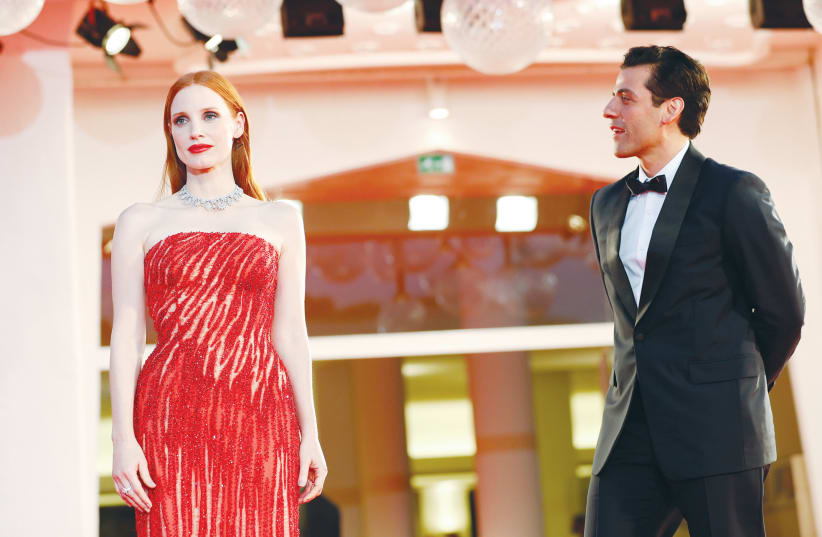Written and directed by Hagai Levi, Scenes From a Marriage examines the relationship between Jonathan (Oscar Isaac), a philosophy professor who was once a practicing Orthodox Jew, and his beautiful and successful wife, Mira (Jessica Chastain), Boston suburbanites who share a daughter Ava and exude marital contentment.
Yet fissures soon appear when Mira’s confession to an affair with Poli, an Israeli start-up CEO (featuring Michael Aloni), creates the catalyst for the disintegration of their marriage. The result is the development of an intense story focusing on infidelity, marriage, and monogamy.
Adapted from Swedish director Ingrid Bergman’s original 1973 drama, Levi’s deft direction, bolstered by superb acting, also elevates Scenes From a Marriage from a drama chronicling an unraveling marriage to a series drawing heavily on themes surrounding Jews in modern America, and the shifting generational portrayals of American Jewry in popular culture.
Years ago, the production of well-known films set in the immediate aftermath of World War II rendered Jews as defenders of their faith. In Exodus, Paul Newman plays Ari Ben-Canaan, the dashing Israeli who captures the heart of Kitty Fremont. Years later, The Chosen’s Reuven Malter, featuring Barry Miller, is the young intellect grappling with the convergence of Judaism and secularism. Though still anchored to his Jewish identity, Reuven smuggles crates of weapons overseas to help defend Israel.
Recently, the strongest Jew emerging on screen is Sarah Nordmann, an attractive female convert who stars in the Australian series A Place To Call Home. Sarah brandishes a gun against a crazed antisemite and stands up to her wealthy husband by insisting that their son be raised a Jew.
The common thread linking said dramas is that all occurred in the shadow of the Holocaust, when world Jewry was at its weakest and global sympathies lay with the founding of a Jewish country. As Jews integrated into the milieu of American society, their representation drifted away from depictions of resilience. Today, on-air Jewish Americans are often characterized as rumpled intellectuals who lack religious conviction. Famous Jewish actors Woody Allen and Larry David are self-proclaimed atheists who, far from heroic, are squeamish around spiders and willing to abandon a spouse following the fake news of an impending terrorist attack.
The propagation of this stereotype is revealed in Scenes From a Marriage, when Jonathan is faced with news of Mira’s affair. Rather than react angrily, he pleads with her to stay. The travesty of his insecurity is in his suffocation of Mira, both figuratively and literally. Jonathan insists on packing Mira’s suitcase before she departs with her lover, and refuses to release his fixed embrace as she begs him to let her leave.
Acting as the professor’s foil, Levi’s casting of an Israeli as Mira’s paramour also highlights Jonathan’s crisis of faith. Promoting a narrative rooted in weakness, Levi pits Jonathan against the younger and sexier Israeli who Mira quips is “not an intellectual.” Indeed, intellectual pursuits are central to the constructs of American Jewish identity. Serving as the epicenter of the academic elite, the backdrop of suburban Boston coupled with Jonathan’s profession underscores this phenomenon in Scenes From A Marriage.
In her memoir, Free As a Jew: A Personal Memoir of National Self-Liberation, Professor Ruth Wisse writes: “Whether biological or political, Jews could not match the militant idea of maleness and so they elevated intellect and learning instead.” Wisse states that “Israel had too many real enemies to give up on male protectors, but not so American liberalism or the Jews in its orbit.”
To her point in Scene I, Jonathan and Mira meet with a graduate student researching gender norms and asks, “What is an attribute you couldn’t imagine yourself without?” Jonathan reflexively answers “Jewish” as his second characteristic, while placing his career as an “academic” toward the end of his list. Embarrassed for subordinating his scholarly status, Jonathan quickly self-corrects and claims, “I should have said that (an academic) first.”
In the final episode, the shifting discourse and social acceptance regarding intermarriage are captured when Jonathan’s Orthodox mother, leaving his father’s memorial, admonishes him about his divorce yet never raises the issue of Mira not being Jewish. Rather, she chides him for not doing enough to create “Shalom Bayis (a peaceful household).
This exchange points to an acknowledgment that even within Orthodoxy, the approval of a “mixed marriage” is entirely plausible given that today, this issue rarely conjures up the disappointment or garners the debate for which it was previously known. Years ago, movies like Crossing Delancey romanticized the union of Jewish Americans. As intermarriage rates increased, US films evolved to reflect the trend. In one example, Keeping The Faith (2000) tells the story of the hip and handsome NYC Rabbi Jake Schram (Ben Stiller), who becomes smitten with Anna Riley (Jenna Elfman). While not Jewish, Riley considers conversion at the end of the film.
For his part, Levi’s emphasis on Jonathan leaving Orthodoxy does not detract from a reverence for Jewish tradition. Quite the opposite. The episode in which Jonathan appears most secure is in Scene III, when Mira appears at his door and witnesses the remnants of Shabbat dinner on the table. Proudly proclaiming that he hasn’t had an asthma attack in months and perhaps channeling his inner Israeli, Jonathan lights a cigarette. Specifically, the tangling of Judaism and spiritual renewal meet in this scene, producing a strong and self-assured Jonathan.
While conceived as a show detailing the destabilization of a marriage, through Levi’s creativity, Scenes From a Marriage uncovers the layers of reality facing American Jewry. The finished product is a drama that is both deeply revealing and distinctly Jewish.
The writer is a pro-Israel advocate. Her work has been published in The Jerusalem Post, JNS, The Algemeiner, and Israel Hayom.

